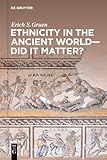Ethnicity in the ancient world : did it matter / Erich S. Gruen
Langue: anglais.Pays: Allemagne (DE), EtatsUnis (US).Publication : Berlin, Boston (Mass.) : De Gruyter • C 2020Description : 1 vol. (X-265 p.) : couv. ill. en coul. ; 24 cmISBN: 978-3-11-068478-0 ; 3-11-068478-0.Dewey: 305.800901, 23Résumé: La 4e de couv. indique : This study raises that difficult and complicated question on a broad front, taking into account the expressions and attitudes of a wide variety of Greek, Roman, Jewish, and early Christian sources, including Herodotus, Polybius, Cicero, Philo, and Paul. It approaches the topic of ethnicity through the lenses of the ancients themselves rather than through the imposition of modern categories, labels, and frameworks. A central issue guides the course of the work: did ancient writers reflect upon collective identity as determined by common origins and lineage or by shared traditions and culture?.Bibliographie: Bibliogr. p. [219]-231. Notes bibliogr. Index.Sujet - Nom commun: Ethnicity -- History -- To 1500 | Ethnicité Antiquité | Judaïsme, Histoire | Christianisme, 30-600 (Église primitive) | Sociologie religieuse | Comparaison sociale | Civilisation antique | History, Ancient Type de document: Monographie
Ce document apparaît dans la/les liste(s):
BEYROUTH-Acquisitions-2022-Trimestre 1
Monographie
Ce document apparaît dans la/les liste(s):
BEYROUTH-Acquisitions-2022-Trimestre 1
Bibliogr. p. [219]-231. Notes bibliogr. Index
La 4e de couv. indique : This study raises that difficult and complicated question on a broad front, taking into account the expressions and attitudes of a wide variety of Greek, Roman, Jewish, and early Christian sources, including Herodotus, Polybius, Cicero, Philo, and Paul. It approaches the topic of ethnicity through the lenses of the ancients themselves rather than through the imposition of modern categories, labels, and frameworks. A central issue guides the course of the work: did ancient writers reflect upon collective identity as determined by common origins and lineage or by shared traditions and culture?
Introduction 1. Were barbarians barbaric? 2. Herodotus and Greekness 3. The racial judgments of Polybius 4. Rome's multiple identities and tangled perspectives 5. Constructed ethnicities in republican Italy 6. The chosen people and mixed marriages 7. Did hellenistic Jews consider themselves a race or a religion? 8. Philo and Jewish ethnicity 9. The ethnic vocabulary of Josephus 10. The racial reflections of Paul 11. Christians as a "third race"? 12. Conclusion
